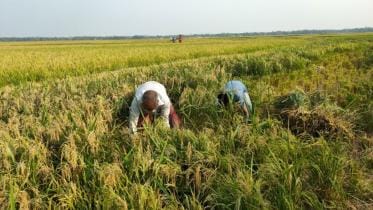The future of retail banking
1 November 2025, 19:48 PM
Business
Simpler regulations needed to ignite startups
21 October 2025, 19:05 PM
Business
Analysis / Are we doing enough for the urban poor?
5 October 2025, 05:00 AM
Business
Opinion / Why is gold hitting record highs in Bangladesh?
22 September 2025, 13:32 PM
Business
Be bold or be boring
7 August 2025, 18:06 PM
Business
BB should be transparent about its consumer credit rating licence
22 May 2025, 08:11 AM
Business
The shadow of a 5% tax: Bangladesh's remittance dilemma
21 May 2025, 05:54 AM
Business
Without capital markets reform, Bangladesh will stay invisible to the world
17 May 2025, 08:27 AM
Business
The challenge of measuring inflation
7 November 2023, 09:34 AM
Business
Is voice technology driving Bangladesh's transition from digital to smart?
12 October 2023, 12:35 PM
Business
The future of retail banking
Retail banking in Bangladesh is entering a moment of reckoning. With the Bangladesh Bank (BB) preparing to issue digital banking licences, and with more organised mobile financial services, AI and platform technology becoming mainstream, it is no longer enough for a bank to be a place where peop
1 November 2025, 19:48 PM
Simpler regulations needed to ignite startups
To encourage youth-led entrepreneurship and turn innovative ideas into viable businesses, the Bangladesh Bank (BB) announced a Startup Funding Facility in July this year.
21 October 2025, 19:05 PM
Be bold or be boring
We have two kinds of brave people. One, the man who casually crosses a six-lane road while talking on the phone, blind to buses, rickshaws, and divine intervention.
7 August 2025, 18:06 PM
The challenge of measuring inflation
Mr Arif, a lower-middle-class citizen, decided to visit his local market to purchase essential goods for his family. To his dismay, he discovered that the prices of almost all necessities had gone up by a staggering 30 to 50 percent. This sudden spike in prices left Mr Arif perplexed and worried about the increasing burden on his already strained budget.
7 November 2023, 09:34 AM
Is voice technology driving Bangladesh's transition from digital to smart?
In the throes of a digital renaissance, Bangladesh, steered by the government's Digital Bangladesh initiative, has achieved a remarkable technological evolution. The nation has seen an uptick in internet connectivity, digital financial services, e-education, and e-commerce, with an entrepreneur-driven surge.
12 October 2023, 12:35 PM
Are we over-communicating to our customers?
In a world that is exceedingly inundated by messages, it is, perhaps, time for businesses to think about whether we are over-communicating with our customers.
2 October 2023, 18:01 PM
Turning fintech into digital bank
Fintech is a buzz word or a disruption or an innovation in this transforming world. We have always seen such debate among different types of experts or colleagues from financial industries at home and abroad. But we can’t ignore its rapid disruption towards financial inclusion and growth.
12 September 2023, 12:57 PM
Challenges and opportunities ahead of South Asian economies
However, rising interest rates and risks in the banking sector in the United States and Europe have increased uncertainties in South Asia’s outlook, given their significant impact on balance of payments, exchange rates, and financial markets.
20 May 2023, 07:15 AM
Women’s challenges in the age of big data
March, and more precisely March 8th, is a time to raise awareness about the remaining path toward equal opportunities for women and men. This is especially challenging in the current days of infoxication where algorithms on the Internet nudge us to jump the discussion from one topic to another day after day. March 8th has passed, yet many gender challenges remain.
7 May 2023, 06:55 AM
In many countries, taxes and transfers make the poor poorer
Most countries, as they emerge from the Covid-19 crisis, are seeking economic growth from weakened fiscal positions. As health and social spending surged to help workers, families, and businesses cope, the economic shock greatly reduced revenues.
6 May 2023, 07:37 AM
Sizzling Cities: Planning for urban heat resilience in South Asia
South Asia is bracing for yet another hot year. Pre-monsoon temperature records were shattered again in 2023 by the hottest February recorded in India since 1901, along with the hottest day in Dhaka, Bangladesh in 58 years in April.
4 May 2023, 07:05 AM
Will US bank turmoil spread to Asia?
The recent bank turmoil in the US has awakened ghosts of past financial crises. While the likelihood of a fully-fledged crisis seems limited, it cannot be ruled out. Policymakers in the region must act now to shield their economies from possible negative spillovers.
3 May 2023, 07:27 AM
We must build food system resilience before the next crisis
In February 2022, news of Russia’s invasion of Ukraine dominated headlines around the world.
18 April 2023, 05:53 AM
Factories or call centres? Asia charts its development path
Asia’s industries, primarily manufacturing, fueled phenomenal economic growth and poverty reduction in recent decades. But today many countries are looking to the service sector as an alternative.
18 April 2023, 05:46 AM
Could ChatGPT be a game changer for international development?
Large language model artificial intelligence, such as ChatGPT, Bard and others, has great potential in the world of international development. But – at least for now – it also has serious limitations.
17 April 2023, 07:17 AM
Biofuel policies and the current food crisis
Policies to boost biofuel production and use—crop subsidies, mandates, and other measures—came under intense scrutiny during the food price spikes of 2007/08, 2010/11, and 2012/13. As prices of maize, grains, oilseeds, and other feedstocks rose in those crises—more than doubling in some cases—critics pointed to their increasing use in biofuel production as a major factor behind high global food prices.
13 April 2023, 07:43 AM
How to tackle soaring public debt
Public debt soared to a record during the pandemic, topping global gross domestic product. Now, with government debt still elevated, the rise in interest rates and the strong US dollar is adding to interest costs, in turn weighing on growth and fueling financial stability risks.
11 April 2023, 09:20 AM
Fiscal policy can help tame inflation and protect the most vulnerable
High inflation can impose serious and lasting costs on the economy and people. But the distributive effects of inflation—the way it transfers money from some individuals to others—are complex.
10 April 2023, 07:00 AM
How Asia can ease scarring from lower investment, employment and productivity
The pandemic, coupled with trade disruptions and Russia’s war on Ukraine, caused lasting harm to Asia-Pacific economies, damaging growth, productivity, and investment.
1 April 2023, 06:51 AM
Women must be at the forefront of the transition to a low-carbon economy
Can we truly reimagine a path to a low-carbon transition and change the climate narrative? This is hard to envision when we witness the unprecedented damage we are inflicting on the planet.
30 March 2023, 07:33 AM





























